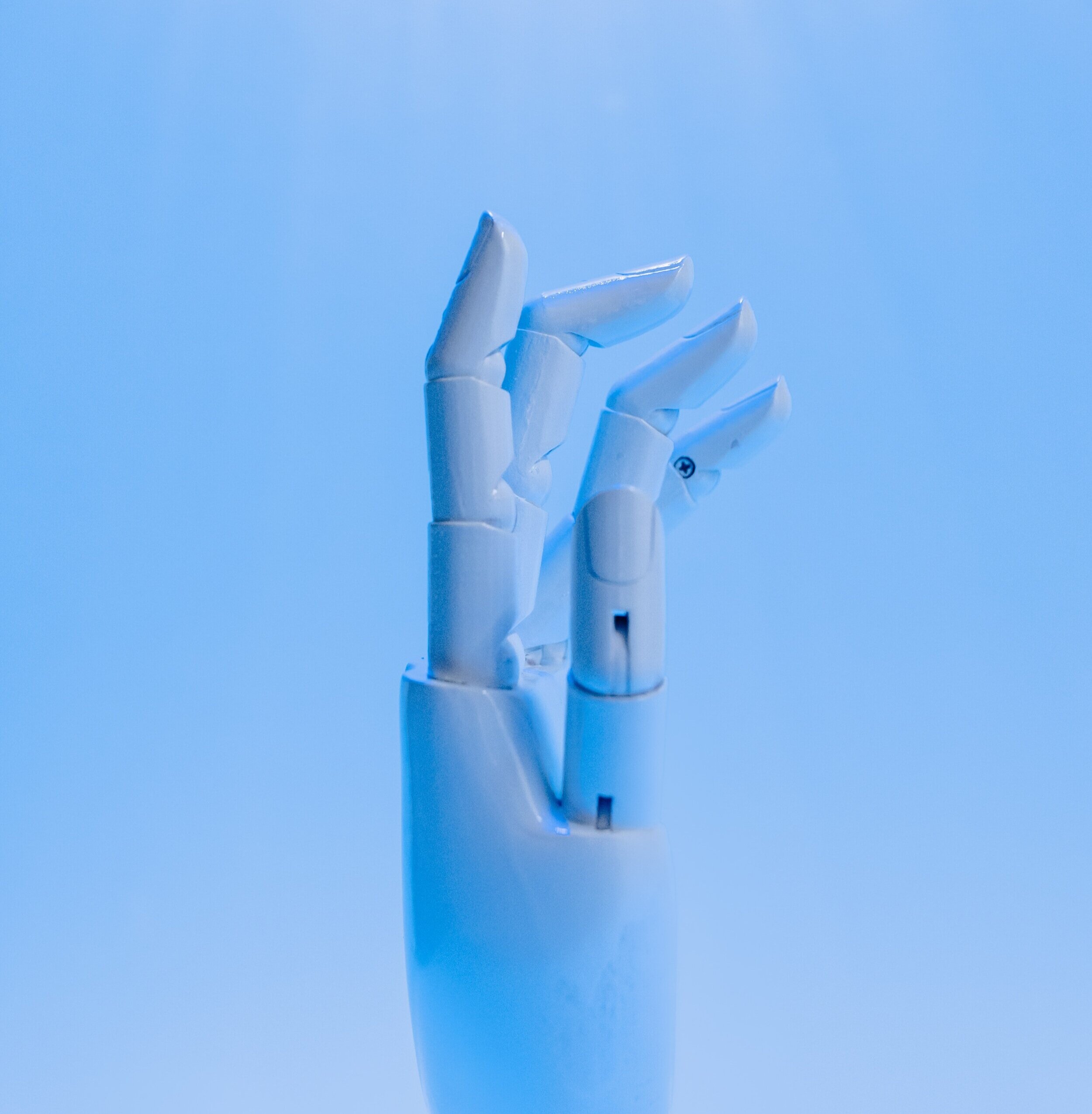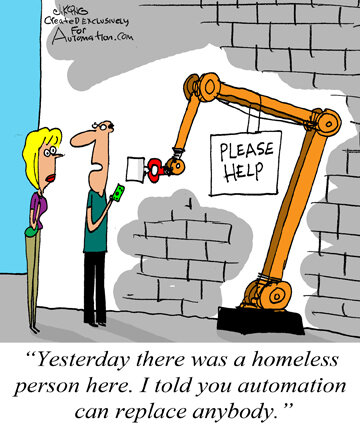Can Automation Save Us From Capitalism?
There was an economist who decided to conduct an experiment to help a group of village people. These people wove blankets for a living and the economist wanted to improve their lives by giving them a machine to make more blankets to sell. Once a few weeks passed, the economist came back and asked the people how they liked the machines. They loved the machines. The economist then asked how many blankets are they making now? The people said they are making the same number of blankets, but now they do it much faster and are now able to spend much more time relaxing and being with their family. Thanks to the power of automation, their quality of life improved in a way that the economist didn’t expect. The machine improved the people's lives not by how much profit it could generate for them, but by the time it gave back to the people to do what they loved most. This is a story about values, and how decentering profit and automating the workplace can be key to a more fulfilling life.
The concept of automation is not a 21st-century concept. Automation in a philosophical sense means to control a process automatically without human intervention. From as far back as the invention of the wheel, humans have been creating tools and technology to automate labor for centuries. When the industrial revolution hit, a load of inventions, like steam power or spinning jennies, automated the workplace and made production faster, safer, easier, and more adept to meet the rising demands and output requirements. Generally, innovation in technology serves as a cheat code enjoyed most by corporations who obtain them to accelerate production, reduce human labor costs, and make more profits.
… in our society, automation has always brought great success for rich corporations who use them, while being a harbinger of aggravated austerity for working-class people.
Unfortunately, such is the nature of a capitalist society, that cheat code usually doesn’t spread to each and every worker. In the battered world of the worker, the prospect of automation has often meant job loss and displacement by a machine or system that can do the work of 10 humans at a more efficient, consistent, and better quality. Technological revolutions supplant existing industries while creating new industries that one may not have even been able to envision before. Workers would likely have to learn totally new skills in the middle of their careers in order to adapt to the changing job market.
Furthermore, in a world where profit is centered above all else, many of the working class are understandably wary, if not downright against these latest advances in technology in the workplace. Some critics envision a slippery slope where an automation revolution will lead them to a reality where most jobs are filled by self-driving vehicles, autonomous robots, and AI while newly-defunct humans bottleneck into the few remaining jobs that are still in need of the human touch; and, with many not being able to find a job, a period of despair, crime and stress is unleashed due to a surge in unemployment and poverty.
A cartoon satirizes the fear of automation being capable of replacing humans at every level of society, but particularly the working class. It also derides capitalism in that even a robotic workforce isn’t safe from capitalist exploitation and austerity. Art by David Visnich.
This fear is due to workers being afraid of being crushed once more in our profit-centered, capitalist society. I think about the workers everywhere, especially in historically colonized countries (where many jobs are outsourced to) that will inevitably be replaced by automated machines as we move toward fully automated factories and workplaces. These workers won’t have the readied skills needed to just pick up a tech job, let alone have the means to attend schooling to receive those skills, resulting in mass unemployment and deepening of the poverty crisis. Also, the complexity of imagining the various job opportunities that a tech revolution brings with regard to job creation, especially in blue-collar sectors, tends to lead to apprehension. This is all a marked consequence of deindustrialization, which often happens as a result of technological revolutions.
You can see how these fears are rooted in the past collective experiences of working people because, in our society, automation has always brought great success for rich corporations who use them, while being a harbinger of aggravated austerity for working-class people. It is documented that the long-term economic effects of automation have meant a surge in productivity, cheapening of costs per product, increasing demand for those cheaper products, which creates a surge in employment and job creation. This outlook ignores the reality that as long as capitalist values such as mass production and profit are paramount above human values (like rest, leisure, and family), there will always be austerity, and no amount of automation will be able to help that.
Automation can give us the opportunity to shift the burden of work from humans to robots.
We are at an unprecedented point in human history because unlike previous technological revolutions, we have the opportunity to now employ autonomous robots and AI systems to complete labor in place of humans for good. These technologies have the range to diffuse across multiple industries, automating everyday life and eliminating the need for physical work, office support, and customer service, which is where the bulk of labor is absorbed right now. It is also in these job sectors that workers experience the most exploitation. Most of these jobs are not that desirable and the quality of life for many workers is reduced because of excessive workload and lack of liveable wages– all caused by greed at the highest level. Capitalist ideas of mass production and the profit motive can’t be sustained. We can't keep living this way and you are fooling yourself if you think otherwise. Automation can give us the opportunity to shift the burden of work from humans to robots. And like the village people, we have to reject the profit motive and center our human values within this transition so that we can reclaim our time.
So, how do we move past the working age of humanity while making sure we can support ourselves? The transition has to be supported with universal income. The biggest question when it comes to universal income is how can we fund it?
Much like the COVID-19 stimulus package, countries will have to foot the bill at first to keep the economy afloat. Like I mentioned earlier, the deindustrialization that will be taking place means many will be losing their jobs and their skills will become defunct. As automation integration happens, blue-collar families that are out of jobs should receive benefits that will enable them to keep up with their bills as well as stimulate the economy. The jobs that do remain for humans may be mostly in the tech, space, art, education, urban development, care provider industries. These industries will continue to grow. As the automated workplace begins to take hold and technology advances, production costs will go down and demand goes up; however, instead of increasing output exponentially, companies will have to follow a mandate that says they cannot exceed a certain amount of production. This ensures mass production and over-consumption cannot take place, two major factors the acceleration of climate change.
We’ve clearly lost our way in the capitalist system, and the way we’ve normalized putting profit over life is one of mankind's greatest failures.
At some point in the future robots will be building other robots and supercomputers will be able to fix themselves, bringing about a totally human-less production process. With the massive profits that automation will bring, a percentage of those profits should be taxed to keep funding this subsidy that will keep all families supported for good. People that choose to work will be able to do so and live comfortably, and those that don’t or can’t work will be able to live comfortably as well. If robots and smart tech are supposed to make our lives easier, why not take it all the way and have robots work for everyone, not just the richest corporations? If corporations all over the world want to wean off of human labor in favor of more efficient and quality-assured automated technology, let them. But, if governments are to avoid causing mass joblessness in the process, which in turn will cause mass desperation, our leaders need to meet the moment with a meaningful universal income bill that will support families so they no longer have to worry about the automation, and can instead embrace it.
We have to change our values as a society. Mass production is not healthy or sustainable. An alarming amount of the products we mass-produce go to waste, especially food. We’ve clearly lost our way in the capitalist system, and the way we’ve normalized putting profit over life is one of mankind's greatest failures. It becomes ever more clearer each day that this system needs to change or our world will come tumbling down. For many it already has. This transition also cannot happen in a vacuum. We need to make sure a transition to a robot-dependent society does not further entrench and empower police and the prison industrial complex. We need to demand transparency and regulations to keep Big Tech in check. We need complete subsidization of education, healthcare, and childcare so that families can use their basic income to live comfortably and experience life instead of paying off bills and debt. With our foreseeable future marked with the climate crisis and ecological breakdown, we need to invest in sustainable public transportation, housing, agriculture, and infrastructure so that we are creating a more sustainable and resilient society free of high costs of living, homelessness, food deserts, and vulnerable living centers. Most importantly, we as a society need to decide to decenter profit and center life.


